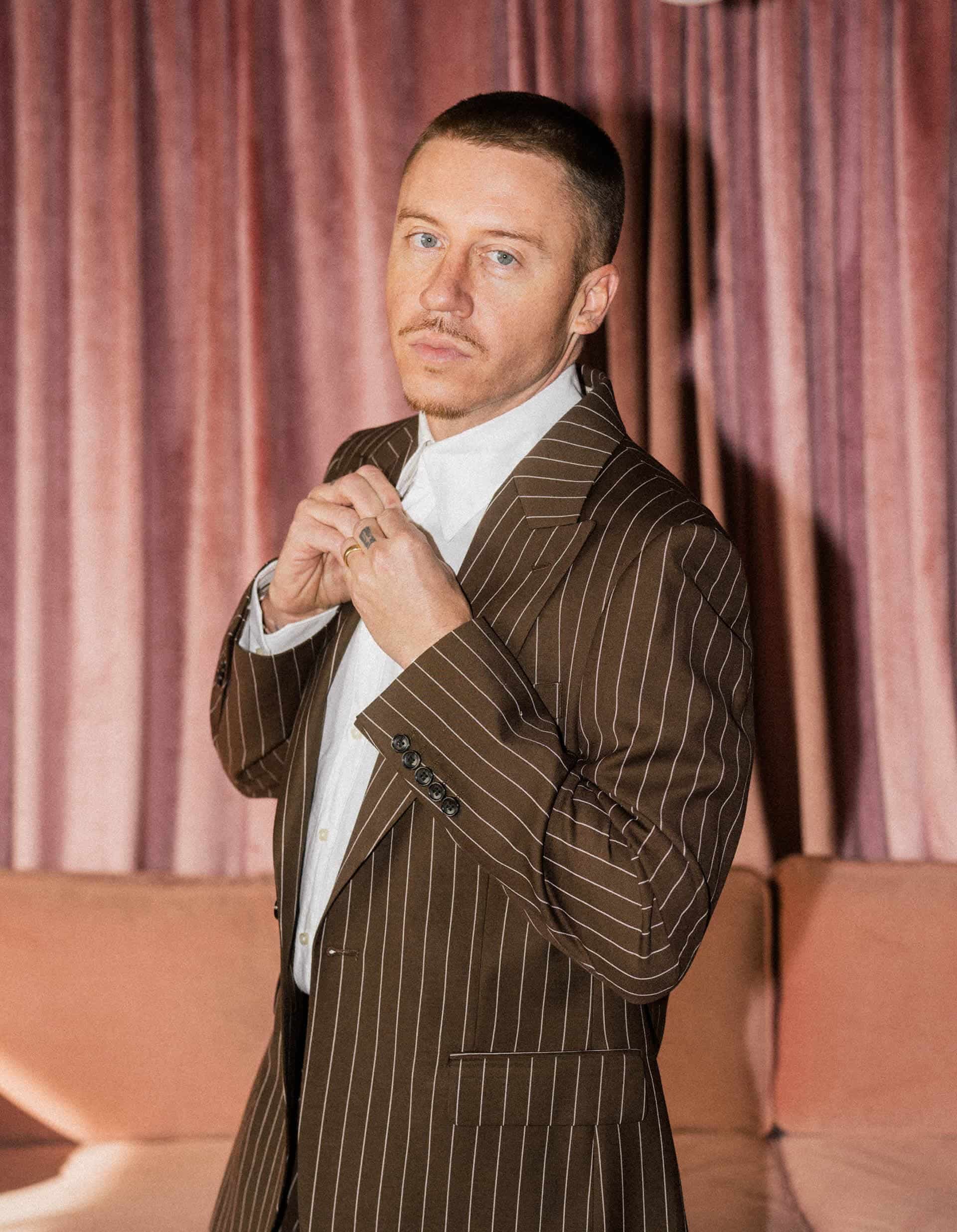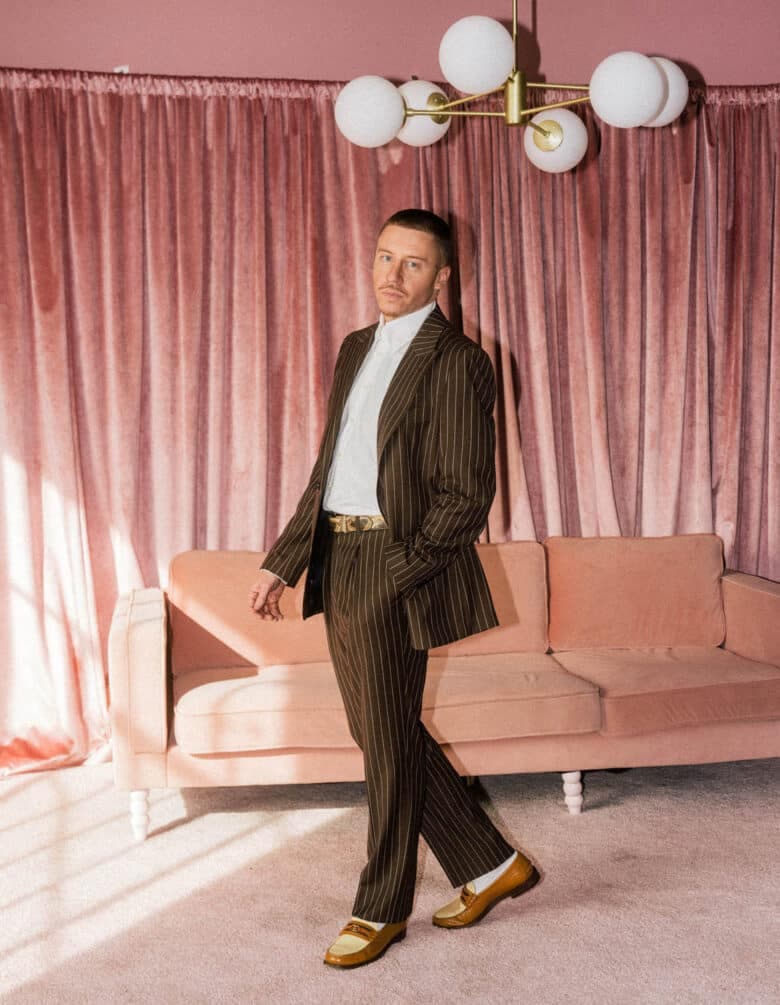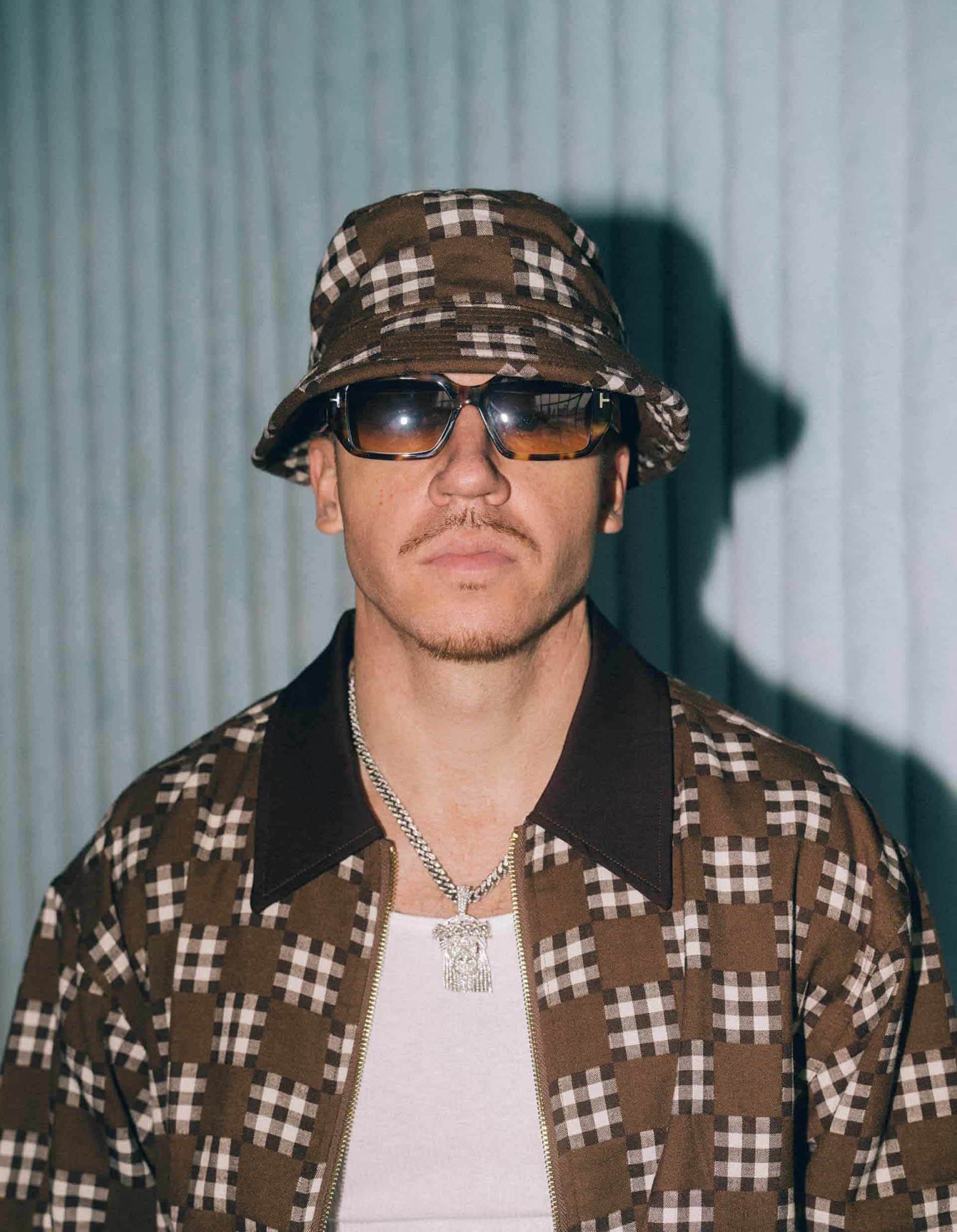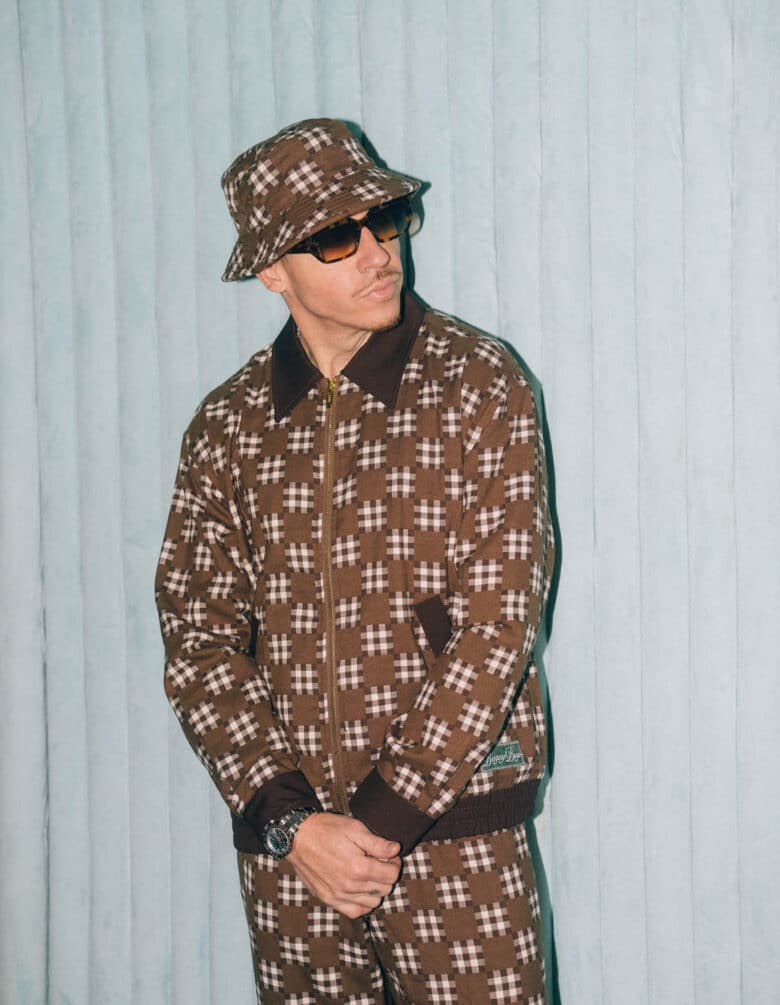The new era of Macklemore

Macklemore’s last album, Gemini, was released in 2017 – pre-COVID, when the buzz of tours and live music was still exciting. Eager to understand his six year leave, our conversation starts with why this breathing space was needed to create his latest musical feat, the self-titled abum BEN. “I think the hope with any album is that you bring people that hear it closer to who you are,” says Macklemore. “There’s a desire for all of us to feel understood.”
With BEN, which was released on the 3rd of March, Macklemore makes clear that this return to music shows a more personal side to him that fans have not yet seen. By delving into the realms of his own vulnerability, the third full-length solo album drops the curtain on the musician and the story behind his successful career. In the likes of ‘HEROES [feat DJ Premier]’ that took inspiration from his 15-year-old self surrounded by the culture of skateboarding and hip-hop, and ‘TAIL LIGHTS’ that brought forth an introspective narrative from his time in recovery, Macklemore traces back to the pivotal moments of his life for this new solo offering. The creative is an open book and presents himself as a project to sit alongside this album, and is not shy in detailing how he uses his own transparency to help others.
Laced with wit, Macklemore steers our talk into another love he has found over his regenerative time away – that being the game of golf. And whilst his sporting skills may be self-admittedly a tad below par (“I hit maybe five people, but I didn’t kill anyone so that’s a win”, he confesses), the artist is hitting his hole-in-one elsewhere with his creative ventures, including his golfing clothing brand, Bogey Boys.
Though depictions of a club-crazy father may spring to mind, Macklemore is still shrouded by an air of unwavering coolness. His career has spanned over a decade, collecting accolades from number ones with Ryan Lewis to speaking with Barack Obama at the White House about America’s opioid epidemic. But despite these milestones, the artist remains humble in knowing that “being able to make music that has had an impact on people’s lives will always be paramount in terms of my career achievements.”
With an impressive dedication to constantly educating himself, Macklemore has reevaluated his artistry in 2023 through the lens of how social media can affect artists, and how it feels like unchartered territory since the last time he released an album. The aim to find himself through his new music has translated into a multitude of lessons he wants to pass on to younger generations, including his own children. “Comparison is the thief of joy,” says Macklemore, relaying his own commitment to remaining content within his music.
This time around, his happiness is balanced with what he deems essential vulnerability, as he reflects on his own struggles with sobriety and how this truth is disrupting the stigmas around addiction. BEN is open to the various interpretations of joy, and how getting there is an individual journey. Here, Macklemore discusses his new music and what’s to come after, from his dream tune being a banger with Celine Dion to why value should not be synonymous with social algorithms…

HUNGER: Hey, Macklemore! It’s been 6 years since audiences last heard from you. What have you been up to in that time?
Macklemore: I’ve been up to a lot. Since the last album, I’ve had two more children, launched a golf clothing company, become a co-owner of two major sports franchises, and developed a very mediocre skillset around the game of golf.
So we are here to discuss your new album BEN. Why the self-titled record, and why did you feel like now was the time to introduce your fans to BEN?
Macklemore: The process of making an album is one of stripping away and removing anything blocking the heart, and that’s what music has always been for me. The album has been a therapeutic release and it has a spirituality to it. There was a lot of time to make it because we had COVID and I didn’t want to put out art that I wasn’t going to be able to tour with. I recorded it remotely on an island with close friends, and it just felt like a return to why I fell in love with making art in the first place.
Where did the idea to call it your birth name come from?
Macklemore: I won’t name an album until the very end. It’s like having a kid, you might think that you love the name George, but then George pops out and you’re like, ‘Yo, this is definitely a Herbert.’ That’s how I feel about albums. I make these records and it’s like they have a spirit, so I just named them my name. Well, my parents named me.
Do you think BEN will change what your audience already knows about you?
Macklemore: I think the hope with any album is that you bring people that hear it closer to who you are. There’s a desire for all of us to feel understood. One of the things that ties us together is having this spiritual experience in human form. But I don’t control how people perceive my art, and I’m the best version of myself when I’m completely divorced from the idea of what are people going to think about this.
What does this album aim to tackle?
Macklemore: What’s in my mind every time I approach the song is how do we make this the best version of the song? What is our intention? You have something like ‘1984’ which is this dance song from the 80s. That intention is very different than a song like ‘TAIL LIGHTS’. Extremely polar opposite ends of the spectrum in terms of emotion.


Being outspoken about issues such as your own sobriety and America’s opioid epidemic, which you have discussed in the past, requires a lot of bravery. How do you approach these topics in your music?
Macklemore: I just tell the truth and I share where I’m at. I have, for better or worse, been very transparent about my own journey of recovery, and I think that it’s for the better. I truly believe that when people are honest, it opens up a space for others to do the same. We are as sick as our secrets. In terms of recovery, there is still guilt, shame, and a stigma around the disease of addiction. Then, of course, around the relapse – but I am a product of both. It is knowing that me telling my story honestly might be the thing that saved someone else’s life today. That’s more important than me than trying to save face.
How do you balance the darker sides of yourself in your music, and how did this journey to finding your true self come about?
Macklemore: I think one thing that felt a little bit different on this album was where we’ve gotten to in terms of social media. The comparison to others occurs consciously or subconsciously when being inundated with highlight reels from everyone else in the world. I think that we are at a point where we are so plugged in and hyper-fixated on screens that it’s taking away our ability to actually connect with one another. We’ve been leading up to this point. Me and Ryan [Lewis] did ‘Fake Empire’ before The VS EP which was 14 years ago. These are concepts that I’ve come back to, but I’ve watched society progress on the tech side and lose the heart side as a result. Part of the darkness of the album was just like, ‘Damn dude, do albums even matter anymore? Is anyone even going to hear this? What if we can’t get in the algorithm?’ Yesterday it worked but today, no one may even see it. We’re having different problems compared to the last time that we rolled out music. One thing that I have come back to is that the people who are meant to hear this music will hear it. I can set it up to be the best that it can possibly be, but when it gets put out into the world, it’s the world’s then, and there’s a freedom in knowing that.
How do you think the industry has evolved since you first came onto the scene?
Macklemore: We have a direct line to fans. That’s the flip side of technology because we have a streamlined way of communication. But there is also increasing pressure from the industry that if you want to be in music then you have to be on TikTok engaging in the comment section. It’s fucking exhausting and it’s way different than it was a decade ago when you thought, ‘We’ll make a music video and then put it out and hopefully the radio plays it.’
Being a new father, has your perception of social media changed?
Macklemore: It has and it is evolving. It’s not about shielding my kids from social media, but I’m definitely going to hold off as long as possible. I think that it’s more about the relationship within having those conversations. If you don’t have conversations with your kid about sex, you just know that at some point they are going to do it. Granted, part of that knowledge comes from experience and growing as a person, but it also comes from having an open dialogue with your parents, and I want to be able to talk to my kids about external validation and comparison. ‘Comparison is the thief of joy’: that is a quote that my kids should know.

You collaborated with the likes of NLE Choppa and DJ Premier on BEN. How did you find these musical partnerships?
Macklemore: Choppa is such an inspiring young person. He’s on his own journey of meditation, healthy living, and semen retention. He’s an impressive young dude, and I think that he has an old soul to him that would be impressive to anyone, and he’s 20-something years old, so that was really refreshing. I would be an OG to someone of that age, and someone that’s an OG to me is Primo [DJ Premier] at the opposite end of the spectrum. I learned from both of those guys and had really great conversations in the creation process.
Is there anyone you’d like to tick off the collaboration list in the future?
Macklemore: Celine Dion, just to make a banger. Something that we could play in Vegas and it just slaps for decades to come. It would be a big ballad with marching drums and maybe some scatting.
Where do you find your happiness outside of music?
Macklemore: I find my true happiness in helping other people, whether that’s in recovery or whether that’s showing up for someone that’s going through it. I think in terms of the pursuit of happiness, I pursue it via golf, which usually doesn’t lead to happiness and leads to more self-hatred. But my kids make me happy and being present with my family. Getting to live vicariously through the eyes of a five-year-old or a seven-year-old – that’s so much fun.
How did you get into golf?
Macklemore: I hit one good shot and I’ve been trying to find that ever since.
You have had some massive moments in your career – winning a Grammy, number ones, and your records. What has been the most surreal moment for you so far?
Macklemore: When I think surreal, I think of meeting Jay-Z for the first time, or having a conversation with Barack Obama at the White House, or watching a basketball game with Michael Jordan in a suite and thinking ‘how did I end up here’ because that shit was fucking crazy.


How do you think a younger Macklemore would feel about where you are now?
Macklemore: Younger Macklemore would have been fucking pumped. He would have been so excited that he was able to tour the world and sing what he wrote. I thought that maybe at a certain point, it would be a 500-capacity room in major metropolitan cities in America. Being able to make music that has had an impact on people’s lives will always be paramount in terms of my career achievements.
What advice would you give to younger artists who are trying to make it in the industry?
Macklemore: The algorithm is not art and it never will be. Don’t make that the centerpiece at the table, make the centerpiece for whoever shows up at the dinner.
Who are some of the younger artists you’ve been excited about recently?
Macklemore: Smino. He is a rapper and singer from St. Louis and I think that he made a modern-day classic. His album is called Luv 4 Rent and I think it’s fantastic.
What message do you want your audience to take away from BEN?
Macklemore: The beautiful part is that it’s open for interpretation. There are times when I won’t even like a song on an album but two years later I hear the same album and it is speaking to me. That’s the magic of music. If I have expectations around what I want people to get out of my art, then I came up short.
What do you think is the secret behind your longevity in music?
Macklemore: Vulnerability. In order to get vulnerable, you have to know yourself, which requires introspection. To celebrate that in a live setting we can find the commonality of our separate experiences on this earth through song. That’s the greatest mystery, and it still puts goosebumps on my arms.
How would you like your musical legacy to be remembered?
Macklemore: I think if I continue to show up, strip away layers, and push myself out of my comfort zone, then I will make art that is worth talking about long after my days here in the physical space. We think about legacy as when I’m finally said and done. It’s not a bigger-picture thing, it comes from the action that I take today.

